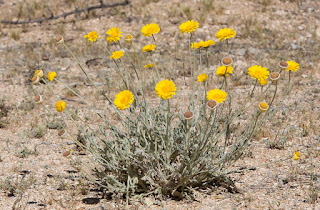Top Plant Picks--2022 Spring Native Plant Sale
By Kim Matsushino
Tucson Audubon's Spring Native Plant Sale is coming up April 18–23, 2022. If you're looking to add to or start your habitat at home, this is the event for you!
If you're unsure of what you need, have questions, or want to learn more, attend our free virtual event next week, April 19: Presentation: Spring Native Plant Sale Selection Guide with hosts Kari Hackney & Kim Matsushino. Register Here
Here are some of our favorite plants you'll find at the Sale. Hope to see you there!
Sun-loving wildflower native to the US desert southwest and northern Mexico. It is an annual or perennial, but is somewhat short-lived as a perennial and readily reseeds itself if conditions are right.
- Height: to 2’
- Blooms: March - October at various intervals; year-round under ideal conditions
Goodding’s verbena (Glandularia gooddingii)
- Height: to 12”
- Blooms: February - October
- Notes: Square stems. A favorite of butterflies and moths.
Blackfoot daisy (Melampodium leucanthum)
A low mounding bushy plant, white daisy-like honey scented flowers in summer. Plant in full sun or part shade in well drained soils.
- Height: to 20”
- Blooms: March - December
Penstemons
Firecracker penstemon (Penstemon eatonii), Parry’s penstemon (Penstemon parryi), Desert penstemon (Penstemon pseudospectabilis)
All of these species have showy flowers in spring and attract hummingbirds and butterflies and other nectar feeders, and readily reseed themselves. Full sun.
- Height: flower stalk to 2’ to 4'
- Flowers: bright scarlet red, pinkish to lavender
- Blooms: February - June, possibly fall
Globemallows
Desert Globemallow (Sphaeralcea ambigua), Fendler's globemallow (Sphaeraclea fendleri), Caliche globemallow (Sphaeralcea laxa)
Drought hardy perennial shrubs that grow 2' to 4' high with equal spread. Showy flowers in the spring, with various colors. Attracts butterflies and other native pollinators. Full sun.
- Flowers: bright orange, white, pink, purplish, or reddish-maroon hues
- Blooms: year-round for Desert; March-November for others
Tufted evening primrose (Oenothera caespitosa)
Produces large, fragrant, white flowers in spring. Grows in tall. Plant in full sun and well drained soils. Beautiful flowers attract moths and other pollinators.
- Height: low, mounding, 6”-12”
- Flowers: white, turning pink with age; to 4” wide opening in late afternoon, fading the following morning
- Blooms: April - September
Wild fuschia, Hummingbird trumpet (Epilobium canum)
Native riparian plant that has stunning scarlet trumpet-like flowers in the summer. Plant in part shade and keep irrigated. Hummingbirds and butterflies love this plant.
- Height: to 2’; may sprawl
- Flowers: reddish orange, tubular, crinkly, with 4 lobes notched in center
- Blooms: June - December
Mexican honeysuckle (Justicia spicigera)
Small shrub that isn't fussy, blooms most of the year, and is attractive to hummingbirds. With yellow-green leaves and bright orange flowers, Mexican honeysuckle grows 2 to 4 feet tall and spreads 3 to 6 feet wide, preferring light shade to full sun exposure. It is fairly drought tolerant, but looks better and grows larger when given regular supplemental water in the summer. It has a moderate to fast growth rate and is not particularly fussy about soil. The primary requirement is good drainage. Water weekly in summer, every other week in the winter.
Desert spoon, Sotol (Dasylirion wheeleri)
Attractive evergreen succulent with sharp toothed silver blue foliage forming a large rosette. Plant in full sun in well drained soil.
- Height: to 3’ and 4' wide and tall; flower stem to 15’
- Flowers: greenish white; tiny, thousands in a narrow cluster to 8’ long. Male and female flowers on different plants
- Blooms: May - August, annually
Fragrant beebush (Aloysia gratissima)
- Height: to 10’
- Flowers: tiny and aromatic; white to purple
- Blooms: March - November










Comments
Post a Comment
Thanks, we value your opinions! Your comment will be reviewed before being published.